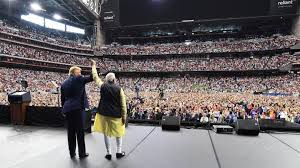Donald Trump’s return to the White House is poised to have significant, wide-ranging consequences for international relations, especially impacting countries like India, China, Pakistan, Russia, and the West Asian region. By Dr Anil Singh

The latest triumph of Donald Trump over the 2024 U.S. presidential election is shaking the world system to compel the nations to recall their diploma and strategic political position in the world. Trump’s return to the White House is surely going to be a much big and wide-ranging consequence for international relations, more specifically the superpowers like India, China, Pakistan, Russia, and the West Asian region. This will depend on how the policies of Trump configure the geopolitical landscape and power and conflict dynamics around the world. In India, Trump’s return has evoked optimism and caution in equal measure.
Certainly, traditional friendship relations exist between Modi and Trump. Events like “Howdy, Modi!” and “Namaste Trump” were one-time lifetime experiences in this regard. And this cannot but raise prospects for further cooperation regarding trade, defence, and security. Trade tensions will still be there because Trump has scalded India with his words over trade policy and has imposed tariffs on Indian goods. This defence relationship has gone up quite significantly, and today, India has emerged as one of the largest importers of weapons from the United States. According to the Stockholm International Peace Research Institute, India has been a clear leader in the global arms-importing nations during the past five years, and the U.S. has emerged as one of its biggest suppliers. This is likely to be continued and increased more during the Trump administration, which will, in turn, further solidify this strategic alliance between the two countries.
Impact on China
China has much to fear from a Trump victory. In his first term, Trump took a hardline position on China and went to a trade war, imposing tariffs on many Chinese goods. Re-election could mean more of the same: bullying China to change its unfair trade practices and further reducing America’s trade deficit. The Trump agreement of Phase 1 was largely regarded as a failure, and this deal also may be renegotiated and reformed. More importantly, all the steps taken by Trump to enhance U.S. defence and its alliances in Asia can be regarded as a constraint on China’s rise in the region because the U.S. has also been Taiwan’s leading weapons supplier, which has always put Beijing in an awkward position. Under pressure from China, the United States has finally approved $2 billion in arms sales by 2024 which includes advanced air defense missile systems for Taiwan. This sale will only heighten the tension with Taiwan within the Taiwan Strait and put more pressure on U.S.-China relations.
Influence on Pakistan
Pakistan and U.S. policy under Trump will be pretty intricately loaded. Even if the Trump administration has been very prudent not to jeopardize good relations with India as well as Pakistan, they have already been stern with Pakistan on many issues, especially their role in fighting terrorism. The U.S. recently cleared the sale of 450 million dollars’ worth of fighter jets to Pakistan, which New Delhi had also objected to. Military sales to Pakistan by the Trump administration may continue along with this policy of building up the capacities of Pakistan to counter terror threats. In the past, this has escalated tensions with India, which regards these sales as harming its security. The Obama administration may also insist that Pakistan do more to make the country’s counterterrorism operations more transparent and accountable, a step that risks tension.
Relations with Russia
Relations between Russia and the United States under Trump are likely to be a mix of cooperation and competition. In his first term, Trump had genuinely attempted to mend ties with Russia which came under tremendous criticism and accusations of collusion. A return to the presidency may mean renewed efforts toward dialogue with Russia on arms control on anti-terrorism issues. However, simultaneously, there are questions about Russia’s aggressive movements in Ukraine and election-interfering activities in the politics of the USA. The USA has enforced sanctions against Russia as it reacts to those movements, but it is still unknown if Trump will continue or deter those sanctions. Moreover, Russia has remained one of the large arms sellers, and it sells to countries like India and Syria. Thus, Russia’s arms sales are possibly influenced by U.S. policies whose intention is trying to contain Russian influence.
Impact on West Asia
In West Asia, the victory of Trump will have crucial consequences for the U.S.-Israel, Saudi Arabia and Iran relations. During his government, there was one unshakable supporter – Israel, whom he recognised as its capital and, what is more, created the Abraham Accords; normalization agreements between Israel and several Arab states directed to the peace treaty in them. It would most probably stay that way, centralizing efforts to consolidate the U.S.-Israel alliance and remove security threats in the region. Saudi Arabia, too, is one of America’s closest allies and is likely to get the same treatment, with added arm deals and strategic cooperation. The largest importer between 2016 and 2020 was Saudi Arabia, and its biggest supplier was the United States, according to SIPRI. In contrast, Trump’s hardest-line views on Iran, including his stance on withdrawing from the nuclear deal with Iran and imposing sanctions, are most likely to enhance tensions in the region. Therefore, the response from Iran to the Trump victory will be critical in ascertaining the stability and security of West Asia.
The election of Trump is likely to further the notion that the United States is an instrument of war and for this reason, militarily and in terms of arms sales. According to reports from SIPRI, the United States has from 2016 up to 2020 been the world’s biggest arms exporting country with a share of 37% of the global total, and it is expected to be so in the future with more arms sales to allies and strategic partners. These policies will have a great deal to do with the balance of power and conflict in regions like South Asia, East Asia, and West Asia. The world nervously waits for the tide his presidency would make in globalization vis-a-vis global stability and security in the years ahead.
Trump’s victory in the recent election will have far-reaching implications in international relationships, especially if one looks at their relationship with key players: Israel, Saudi Arabia, and Iran. The administration of Donald Trump has been a huge ally of Israel. It recognized Jerusalem as the capital and facilitated the Abraham Accords which normalized the relationship between Israel and some Arab states. It is understood that there will be continued support, though more attention is to be paid to consolidating the alliance between the U.S. and Israel in the coming years while reducing overall security threats to the region. Probably, the strategic and key ally of the U.S. will also benefit from Trump’s return in the form of further arms sales and strategic cooperation. Saudi Arabia is the largest arms importer between 2016 and 2020 while the U.S. remains its top supplier. Yet with his hardline stand on Iran about withdrawal from the Iran nuclear deal and imposed sanctions, this may even escalate tensions in this region. This is going to be an interesting time to see how Iran reacts to a Trump victory since this will also determine the stability and security situation of West Asia.
Trump’s victory will likely blow the perception of the U.S. as an arm for wars, especially in arms sales and military intervention. The United States is the world’s largest arms exporter-the country has accounted for 37% of global deliveries in the period between 2016 and 2020, the SIPRI reports indicate. This trend is also likely to continue with the Trump government, the sale of armaments to allies and strategic partners is likely to soar. These policies are going to cut very deep into the world of international relations because they set a benchmark while defining the dynamics of power and conflict in numerous regions such as South Asia, East Asia, and West Asia. The world would be waiting with bated breath to see how Trump’s leadership may soon alter the apparent paradigm of global stability and security in the years to come.
(The author is Editor STAR Views and currently in Washinton D.C., USA.)













